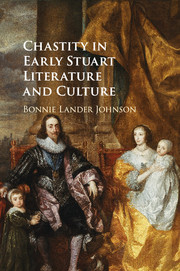Book contents
- Chastity in Early Stuart Literature and Culture
- Chastity in Early Stuart Literature and Culture
- Copyright page
- Contents
- List of illustrations
- Book part
- Introduction
- Chapter 1 Unchastity in Shakespeare'sThe Winter's Tale, Caroline court performance and theological dispute
- Chapter 2 Chastity, medical controversy and the theatre of John Ford
- Chapter 3 Chastity, William Harvey's demonstrations and court ceremony
- Chapter 4 Marian chastity: Caroline masques and Henrietta Maria's chaste births
- Chapter 5 Protestant chastity: the language of resistance in Milton's ‘A Maske’ andA Maske
- Conclusion
- Bibliography
- Index
Chapter 5 - Protestant chastity: the language of resistance in Milton's ‘A Maske’ andA Maske
Published online by Cambridge University Press: 05 December 2015
- Chastity in Early Stuart Literature and Culture
- Chastity in Early Stuart Literature and Culture
- Copyright page
- Contents
- List of illustrations
- Book part
- Introduction
- Chapter 1 Unchastity in Shakespeare'sThe Winter's Tale, Caroline court performance and theological dispute
- Chapter 2 Chastity, medical controversy and the theatre of John Ford
- Chapter 3 Chastity, William Harvey's demonstrations and court ceremony
- Chapter 4 Marian chastity: Caroline masques and Henrietta Maria's chaste births
- Chapter 5 Protestant chastity: the language of resistance in Milton's ‘A Maske’ andA Maske
- Conclusion
- Bibliography
- Index
Summary
- Type
- Chapter
- Information
- Chastity in Early Stuart Literature and Culture , pp. 138 - 171Publisher: Cambridge University PressPrint publication year: 2015



